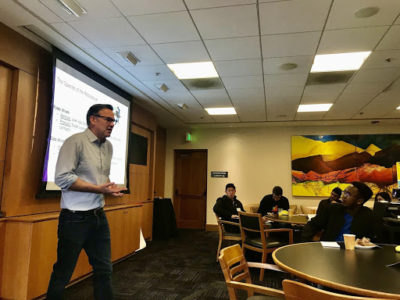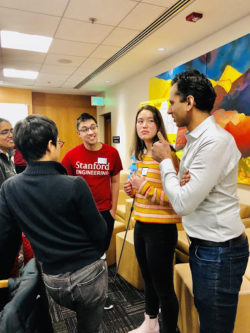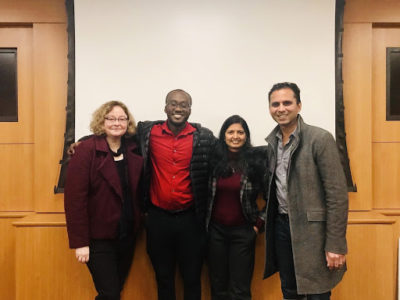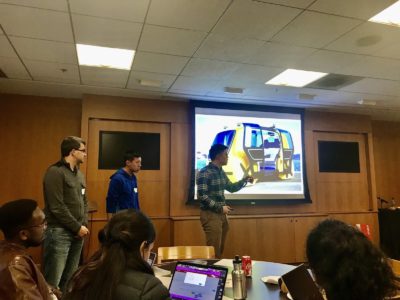Stanford Law Pop-up Class Explores Artificial Intelligence and the Law

In January, CodeX — the Stanford Center for Legal Informatics and Stanford CS+Social Good hosted a pop-up course for students interested in the intersection of artificial intelligence (AI) and the law. Exponential Innovations AI & Law Bootcamp introduced 25 Stanford students from the law school, computer science department and graduate school of business to AI, law and ethics via a hands-on, accelerated course that included lectures and team project work. The two and a half-day Stanford Law program gave students an opportunity to collaborate closely with students outside of their educational programs and access coursework from some of the leading tech, law and business schools in the country. Throughout the course, guest speakers and judges from leading companies like AirBNB, Google, HP and others, worked with students to refine their AI business startup ideas and create compelling pitches.
“Our aim was to provide an experiential educational experience in which we challenged student teams to immediately apply the concepts we taught in class — artificial intelligence, product management, ethics, privacy and fairness — towards creating business prototypes in cutting-edge technology areas and pitch them to a panel of venture capitalists,” said Stanford CodeX Fellow Jay Mandal who co-organized the class with CodeX Fellow Stephen Caines and Daniel Linna, a CodeX affiliated faculty member.
Multidisciplinary, Cross-campus Learning
Even though the majority of attendees had minimal exposure to all of the different fields of study involved in the pop-up course, the students were able to collaborate across disciplines to build and present innovative, AI-driven business prototypes in healthcare, autonomous vehicles, big data, automated professional services and smart contracts.

“The projects the students developed during this CodeX popup course demonstrated the incredible creativity and analytical excellence that is unleashed when you bring together a diverse mix of students from the leading schools at Stanford,” noted Roland Vogl, CodeX Executive Director and Stanford Law Lecturer.
Vogl, Mandal and other senior Stanford faculty gave lectures covering AI technologies and tools along with product management and business pitching techniques. Students were also able to hear from distinguished guest speakers, including Rajen Sheth, Google Cloud Vice President of Product, and Rafik Bawa, AirBnB Deputy General Counsel for Product, who lectured about the challenges of using AI in their respective companies and the associated ethical considerations. Dan Linna, Senior Lecturer at Northwestern Pritzker School of Law and Stanford Codex Affiliated Faculty, lectured on the strengths, weaknesses and issues of fairness in applying AI technologies.

Sheth, who also leads Google’s task force for AI and ethics, talked about the ethical dilemmas with AI. “I was incredibly impressed at the diverse group of skills and backgrounds in the class, and the passion for doing great work with AI,” said Sheth. “The group thought about AI in the right way and considered a number of perspectives in how to shape the technology to make our world better.”
The speakers also talked about the need for lawyers to apply multidisciplinary thinking in order to be successful as an in-house counsel for a company that utilizes AI. Bawa also engaged students in an exercise to think through a real life AirBnB legal issue with usage of artificial intelligence in automatically matching guests with hosts.
“We guided students to also consider ethics, privacy and fairness issues with AI and exponential innovation areas to ensure that students developed sustainable, responsible innovations for the class and instill this thinking in their future entrepreneurial pursuits” said Mandal.
Diverse Teams = Innovation
For the hands-on part of the pop-up course, students worked in teams to brainstorm business ideas that could use AI to address an unmet need. Coaches from industry (Google, HP, and startups) and academia (Stanford GSB and Carnegie Mellon Engineering) were invited to hear and critique the students’ project pitches.
“A great lineup of speakers, teachers and fellows, along with a diverse group of lawyers, engineers and MBA students, was the perfect recipe for an engaging bootcamp that provided me with skills and tools that will be of great use in my future practice and in the analysis of the challenges brought by new technologies,” said Othon Flores Juarez ‘20, Stanford Law LLM student.

During the final hours of the course, student teams incorporated the feedback they received from coaches and speakers, refined their business ideas, and finalized their pitch deck. In the class finale, each student team presented their final business prototype to the judges and their student peers, focusing on their use of AI and the corresponding technical weaknesses, privacy, fairness, and ethical considerations for each project.
The judges, including Jocelyn Goldfein, Managing Director and General Partner at Zetta Ventures, and Aparna Sinha, Google Cloud Product executive, spent additional Q&A time with each student team to dig deeper into the ideas. The judges then chose their favorite projects (see list below). “Jay Mandal and CodeX have broken new ground in this law pop-up class that aims to prepare students for the interdisciplinary challenges AI and modern technologies pose to our future,” said Sinha.
“Witnessing the students embrace such a difficult challenge with confidence and a thirst for knowledge was inspiring,” said Caines. “Their drive and energy propelled many of them from having minimal familiarity with these technologies to making a full-fledged pitch in just over two days. Only at Stanford!”
The Projects
- Freshify – Aiming to reduce the amount of food wasted by American households, Freshify uses computer vision algorithms to inventory food, predict expiration of food, and generate meal suggestions that maximize the consumption of refrigerated items.
- Team: Craig Maughan (Law), Carla Cepeda (Law), David Yue (CS/Engineering), Christina Pan (CS/Engineering).
- mScore – Access to financial institutions such as banking is a key to economic mobility needed in emerging markets to grow their economy and quality of life. mScore aids the unbanked by generating credit score equivalents that can be used to assess credit worthiness for services like loans.
- Team: Kenneth Nturibi (CS/Engineering), Jingsi Peng (Law), Maya Rassai (High School), Alan Jaime Misrahi (GSB), Inesha Premaratne (Law).
Winner: Best Business Overall
- Parenting your Parent – With a focus on the greying of America, this company provides a wearable devices that helps monitor, predict, and protect the health of seniors with the capability to communicate this information to loved ones, enabling seniors to live more independent lives.
- Team: Khoa Cao (CS/Engineering), Sophie Andrews (CS/Engineering), Madhu Sivaramakrishnan (GSB), Yaser Alorainy (Law), Atsushi Oshima (Law).

Winner: Best Application of AI
- Ride2School – Addressing the transportation needs of the 80 million school-aged children in the US with intelligent self-transport using autonomous vehicles, Ride2School gives parents flexibility and peace of mind in getting their children to school.
- Team: Richard Sun (Law), Krishna Patel (CS/Engineering), Kaushik Narasimhan (GSB), Han Lin Aung (CS), Othon Florez Juarez (Law), Jasmine Shao (Law).
Winner: Best Pitch
- Devices Without Borders – Addressing the large transaction costs associated with securing patent rights for the creators of medical devices, Devices Without Borders aims to use natural language processing and other technology to aid in the creation and filing of patent claims.
- Team: Ruohan Zhan (Law), Stefano Rensi (CS/Engineering), Daniel Knapp (GSB), Susannah Shattuck (GSB), Menglu (Rose) Lu (Law).
